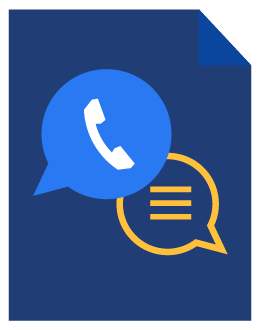Discovery Call Questions: Everything You Need To Know


Heather Lopez
This post was originally published in September 2018 and has been updated for accuracy and comprehensiveness.
"Did you know that reading this post could improve your sales prospecting?”
This is a great example of a discovery call question that can specifically be used early in the sales development cycle to gather valuable information and context around the organizational landscape of your prospect and their specific place in it.
In practice, the answer to this question will give you a window into their work life and further context about their company structure while keeping the conversation light but still interesting and natural. The details you discover are useful not just for appointment setting but for the entire sales process. The quality of your discovery call questions can be the difference between closing a deal and losing one – so put serious time, thought, and effort into devising them.
In this piece, we’ve compiled a list of proven discovery call questions and further lessons and advice about them.

Download our list of 28 Discovery Call Questions
Get the most out of your discovery call questions with our tips, best practices, and practical examples you can use in your own sales development outreach.
Discovery Question Goals
“You know you are running a modern sales team when selling feels more like the relationship between a doctor and a patient and less like a relationship between a salesperson and a prospect.”
- Mark Roberge, Senior Lecturer at Harvard Business School and former Hubspot CRO
Essentially, a great salesperson should operate like a great doctor. The good ones don’t just give you a generic pitch with information you could easily find on their website; they’re talking with you, trying to uncover context, and they earn your trust by prescribing the right solution to treat the unique pains of your business.
Building off this idea, an SDR should similarly operate like an intake nurse – gathering information on the prospect (their patient) to save time for the salesperson to formulate the solution to their unique issues.
The intake nurse isn’t making the final diagnosis but something that’s equally important to the process. They’re asking specific questions that will allow the doctor to give a more personalized diagnosis and treatment plan. The same is true with SDRs. By asking good discovery questions to qualify leads, the sales team saves considerable time and effort in two critical ways:
- In order to create a sales-qualified opportunity, sales needs answers to discovery call questions. When SDRs get answers early, the sales meeting can focus on the pitch instead of on qualifying.
- By asking discovery call questions early, bad leads can be quickly identified and removed before they take any more time away from your sales team.
Additionally, you may discover that your prospect isn’t aware that they even have a problem at all. We’re not just trying to find the problem though. Like a good doctor, we’re trying to identify the context of how it uniquely affects our patient, the prospect. Asking good questions will also help put them in the right mindset to consider a new solution.
Top things to look for with discovery questions
When conducting discovery calls, the main thing to look for is specific lead qualification criteria – something we discuss in more detail in our Lead Qualification Criteria, Process, and Tools article. We use these criteria to accurately discern when a lead is ready for a sales conversation once a predetermined threshold has been reached.
These are the criteria covered in our lead qualification article:
- Is this company the right fit for our offering?
- Am I reaching out to the right individual?
- Do they have a clear or urgent need that our solution addresses?
- What is their practical timeframe for implementation?
BANT (Budget, Authority, Need, and Timeframe) is another framework we use, originally created by IBM for qualifying opportunities. Let’s look at the criteria in their terms:
- Budget: What is the prospect’s budget?
- Authority: Does the prospect have decision-making authority, or is she an influencer?
- Need: What is the prospect’s business need?
- Timeframe: In what timeframe will the prospect be implementing a solution?
These are the big questions your sales reps should be prioritizing in order to create an SQO (Sales Qualified Opportunity). When a prospect provides compatible answers for at least three of the four BANT items, the threshold is reached.
As an SDR, you don’t necessarily need to get an answer to all of these questions. Even so, it’s important to remember that every discovery call question you do receive an answer to saves critical time for your salespeople. This is especially true if it turns out to be an unqualified lead that you can quickly eliminate before it gets to sales in the first place.

Subscribe to EBQ's Bimonthly Newsletter

Subscribe to EBQ's Bimonthly Newsletter
Proven discovery call questions for sales development outreach
We’ve prepared a list of well-tested discovery call questions organized by category. While the majority of these questions are open-ended, we’ve also incorporated some close-ended questions which are used to gather more specific qualifying information. Nearly all of these questions have come from our senior staff or have been pulled directly from the sales playbooks we’ve used in our client’s campaigns.
Download our list of discovery call questions to save them as a reference for you and your team.
What’s the prospect’s level of authority?
Questions – What you should ask your prospect:
- Who would you need input from in your company in order to make a purchase decision?
- What does your decision-making process currently look like?
- How long have you been with the company?
- What department(s) are you currently affiliated with?
- What does a typical day in your role look like?
Intention – What you want to learn from those questions:
The focus of authority discovery call questions is to determine things like:
- Is the prospect a high-level decision-maker?
- Are other decision-makers involved? What is their role in the process?
- What level of influence does the prospect have within the company?
What are their important or immediate business goals?
Questions – What you should ask your prospect:
- What areas of business are you most focused on with regard to your goals?
- Does your company currently have any product launches planned?
- How is your company planning to achieve [business goal]?
Intention – What you want to learn from those questions:
While business goals aren’t an element of BANT, you can still learn valuable details from your prospect regarding their company’s:
- Spending priorities and allocation of resources
- Business objectives and their level of prioritization
- Perception of the unique value of realizing their business goals
- New potential business opportunities
Are there any pain points they’re struggling to address?
Questions – What you should ask your prospect:
- What challenges are you currently facing? Such as [pain points your solution treats]?
- What are the most apparent pain points you’re seeing within the organization regarding _____?
- How much would your day improve if you were able to alleviate these issues?
- What would life within the company look like if this issue continued to be unresolved?
- What does your ideal solution look like, and how much would it help you?
- What challenges facing the company really keep you up at night?
Intention – What you want to learn from those questions:
Pain points are our bread and butter. Pain is what we’re treating with our specialized solution. These questions reveal what is especially important to the prospect, and furthermore, where they can see the value in your solution.
Most importantly though, it informs your sales rep about what specific areas they should focus on. If your solution treats ten pain points, but the prospect only really cares about two, then there’s no reason to waste time by going into detail on the points they don’t care about.
Does their current solution adequately address the problem?
Questions – What you should ask your prospect:
- Have you used products similar to [our solution] in the past?
- How are you currently trying to handle [problem]?
- What obstacles do you run into with your current solution?
Intention – What you want to learn from those questions:
Before you really start to pitch your new solution, you first need to understand how the prospect and their organization are currently handling the problem. Knowing what solution the prospect is currently using will be helpful for sales when crafting their pitch. If it’s a solution they’re familiar with, they can use their knowledge of its strengths and weaknesses and formulate a pitch that compares the two to the advantage of their offering.
What’s the budget for their current solution (or an alternative)?
Questions – What you should ask your prospect:
- How much do you pay for your current solution?
- How much money could be budgeted for an alternative solution?
- What are the biggest benefits and weaknesses of your current solution?
Intention – What you want to learn from those questions:
Typically, we don’t have our SDRs ask too many budgetary questions. They usually focus on questions related to company size instead. In our experience, these are far more relevant for sales reps who are attempting to create an SQO.
There are many discovery questions you can ask but we want to stress again that you don’t need to ask all of them nor should you – unless you want to seriously test your prospect’s patience.
At EBQ, we typically have our SDRs ask four to five discovery questions that capture the environment or high-level pains but the number of questions can (and should) always be adapted to the unique solution you are selling. You will almost certainly need to create questions that are hyper-specific to your offering.
What’s the size and structure of their company?
Questions – What you should ask your prospect:
- What is the total number of employees within your company?
- How many individuals do you think would have a potential need for this solution/system?
- How many people do you have assigned to ____ team/department?
- How many hires do you typically have each month?
- How many locations does your company have?
Intention – What you want to learn from those questions:
Most of these questions are closed-ended questions intended to find necessary qualifying information about a company. The point is to determine whether the company is worth your time. At EBQ, we typically only levy SDRs for sales sizes of around $20,000 or more.
For example, if you sell software at $100/month per seat, it’s probably not a wise use of time and resources to have your SDRs and sales reps working on a company when only three of their employees would be using your software.
Do they have a timeframe on adopting a new solution? What is it?
Questions – What you should ask your prospect:
- Are you actively looking to change your [solution] this year? If not, when?
- Whats the timeframe for this project? How soon would you want a new system up and running?
- Are there any active contracts or solutions that would delay the process?
Intention – What you want to learn from those questions:
These are mostly closed-ended questions. Your intent here is to receive highly specific responses – you’re not just fishing for general content with these questions.
Writing discovery call questions – think like your target buyer
The best discovery questions are always crafted around a deep understanding of the challenges of the industry being targeted. When you’re looking to improve your discovery call questions or you’re drafting them up for the first time, try a little roleplay as your target buyer persona and consider:
- What are the challenges I experience in my day-to-day?
- What are my biggest pain points?
- What is my perception of value within my industry?
- How would the offering help me? What issues would it solve?
These questions will provide you with a solid foundation. Ultimately though, you have to develop a more thorough understanding of your prospect – figuratively walk a mile in their shoes – in order to have any chance of successfully passing them along to your sales team.
If your persona isn’t well developed and your understanding of your prospect’s pain points is thin at best, you may need to conduct additional research and interviews with previous customers to see how you can improve your level of understanding.
The advice above will help you find the right questions to collect information and context, but they may not necessarily be compelling enough on their own to provoke the real valuable responses you should be looking for. A question that provokes the prospect in such a way should be open-ended and stimulate the prospect to think.
For example:
“Can I ask you why you went with your previous solution?”
This question appears simple and straight forward but it simultaneously jogs the prospect’s memory on the specific details of why they first procured their current solution and allows you to capitalize on those details in areas where your offering clearly outperforms their current solution, solves an issue, or otherwise provides greater value.

Download our list of 28 Discovery Call Questions
Get the most out of your discovery call questions with our tips, best practices, and practical examples you can use in your own sales development outreach.
Good discovery call questions lead to deeper understanding
When it comes to discovery call questions, context is always key. Gaining a deeper understanding of your prospect’s pain points and, more critically, the unique stories behind them will give your sales team a more complete picture when closing with a prospect.
Great discovery questions will always provide you with that ever-important context while continuing to stimulate the conversation.
When your SDRs have great discovery call questions at their disposal – whether you pick them or create them in-house – the end result is the same. You will be able to qualify better leads and equip your sales team with information that can drastically improve their chances for a successful closing.
Need help building out a sales development campaign or program of your own? We’re here to assist you. Contact us today to start setting more sales appointments.

